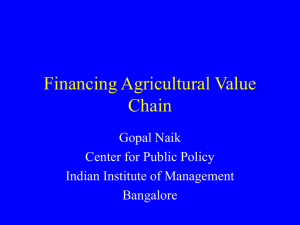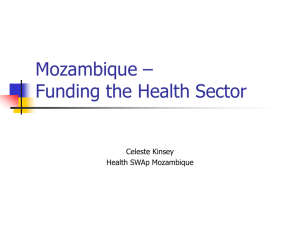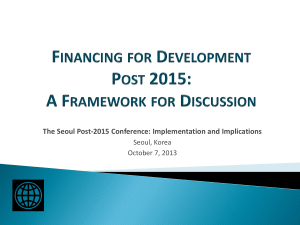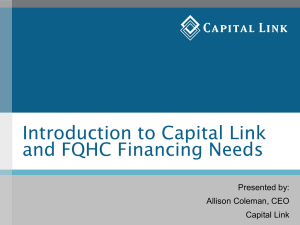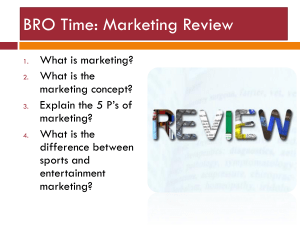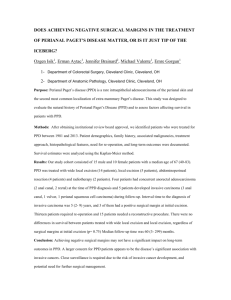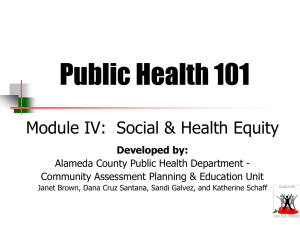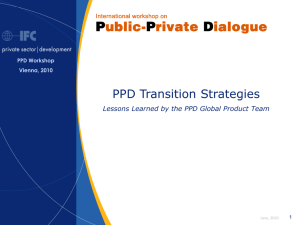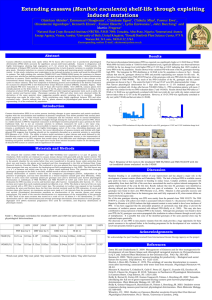Presentation
advertisement
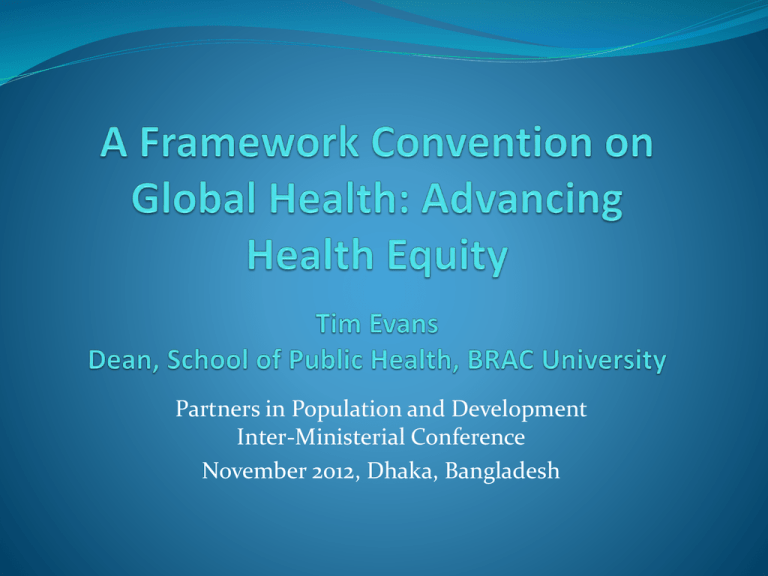
Partners in Population and Development Inter-Ministerial Conference November 2012, Dhaka, Bangladesh Overview What is the Framework Convention on Global Health (FCGH)? Why an FCGH? Benefiting the Global South Towards an FCGH Legal pathways towards a global health treaty Background to the FCGH: Persisting Health Inequities and Challenges Health inequities Life expectancy in Sub-Saharan Africa (2011): 54 years Life expectancy in high-income countries (2008): 80 years Continued and emerging global health challenges AIDS, TB, hunger, maternal and child deaths, lack of access to sanitation, etc., persist Rapidly growing NCDs, injuries in the South Background to the FCGH: Global Response Required and Possible Pressures requiring global response Growing but insufficient funding Health worker migration Population growth Trade and intellectual property (access to medicines) Global industry (e.g., tobacco, “big food”) Power of law Framework Convention on Tobacco Control 176 countries party to FCTC Action: more than 60% of 72 long-term state parties have increased tobacco taxes and expanded smoke-free public places Proposed Response: The FCGH Proposal for a new global health treaty Core elements defined Framework convention – global framework and commitments with protocols on specific issues (e.g., R&D, health worker migration) UN Secretary-General Ban Ki-moon (2011): “Let the AIDS response be a beacon of global solidarity for health as a human right and set the stage for a future United Nations framework convention on global health.” UNAIDS has strongly endorsed the need for an FCGH Central FCGH Elements Universal health coverage Standards for health systems, public health interventions, underlying determinants of health Financing framework covering domestic and global health financing Right to health grounding, including accountability, participation, equity Elevate health in other regimes (e.g., trade, financing, agriculture) Alignment with national health strategies and systems Innovative financing mechanisms Strong mechanisms of monitoring, evaluation, and compliance Health and Equity Legal framework for policies and funding to significantly close health inequities and benefit health especially of least healthy populations Health equity Country-specific equity targets and strategies Prioritize and support policies and processes to meet health needs of marginalized populations Women’s rights Address violence against women (e.g., legal capacitybuilding, norm change) Maternal and child mortality audits Population and Sustainable Development Wealth from health Productivity increase from better health Improved child health > improved education > increased wealth Sustainable development and population Universal health coverage to include comprehensive reproductive health services Reduce child mortality > reduced fertility Access to Medicines and Health Workers Protect access to medicines Require bilateral and multilateral trade agreements to protect access to medicine R&D Protocol based on WHO’s Consultative Working Expert Group Targets on public financing for R&D to address health needs in the South Research outcomes as global public goods Health worker migration Build on WHO Global Code of Practice on the International Recruitment of Health Personnel Accountable Health Systems Accountability > increased confidence and legitimacy of state Strengthen government efforts to improve population health State and development partners ultimately all accountable to the public, especially those suffering most from health inequities Mechanisms Transparency Remedies to health rights violations Corrective measures where shortcomings Country-led Processes Establish legal norm and mechanisms to increase development partner alignment with national health plans developed through inclusive, participatory processes Framework for sufficient, predictable, long-term financing Benefiting the people: Strengthen capacities and policies to ensure community and civil society input in local, national, and international/development partner policies and to advance the right to health Inclusive and participatory processes for translating FCGH norms to national targets and policies Possible Pathways Towards the FCGH UN General Assembly Establish committee to explore possibility (and begin drafting?) an FCGH Request member states to submit to Secretariat views on an FCGH World Health Assembly Request Director-General initiate process towards an FCGH Establish working group to negotiate and draft an FCGH UN Human Rights Council Human Rights Council Advisory Committee to explore or negotiate an FCGH PPD Actions Advance the FCGH Briefing of PPD member state UN ambassadors UN or WHA resolution to support and initiative process towards an FCGH PPD permanent representative to UN and PPD ambassador send diplomatic correspondence to UN Secretary-General Support FCGH principles in post-2015 development goals The FCGH and the post-2015 development agenda FCGH and Post-2015 Incorporation, available at http://jalihealth.org/publications.html Involving Civil Society and Communities Ensure FCGH meets the needs of poorest and most marginalized populations Support Southern civil society and communities in input into FCGH Civil society and communities as crucial allies towards a transformative FCGH Joint Action and Learning Initiative on National and Global Responsibilities for Health (JALI) What is JALI? A global civil-society led coalition advocating for and supporting development of an FCGH Committed to an ambitious treaty that will truly be grounded in the right to health Initiating broad and inclusive process to develop FCGH contents JALI Who is JALI? Steering Committee and Secretariat members Center for Human Rights and Development (Uganda) Communications for Development Centre (Nigeria) Centre for Excellence for Universal Health Coverage (Bangladesh) Medico International (Germany) O’Neill Institute, Georgetown University Law Center (USA) Hélène De Beir Foundation (Belgium) Individual members from Brazil, India, Kenya, Nigeria, Norway, United Kingdom Advisory Panel being formed Who supports JALI? Rockefeller Foundation For Further Information… JALI developing a “framework of a framework” to give more detail on the proposed FCGH Draft planned for end of 2012 www.jalihealth.org Contacts Sameera Hussain (sameera@bracu.ac.bd), School of Public Health, BRAC University, Bangladesh Moses Mulumba (mulumbam@gmail.com), Center for Human Rights and Development, Uganda Eric Friedman (eaf74@law.georgetown.edu), Georgetown University Law Center, USA


